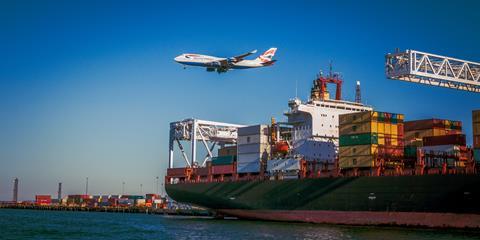
Last week’s Microsoft software breakdown could continue to disrupt international supply chains “for weeks to come”, trade experts have warned.
A global tech failure last Friday, 19 July, hit airlines and cargo shipments around the world, with thousands of flights grounded or delayed at major hubs in Europe, Asia and North America.
This was due to a malfunctioning software update by third-party provider CrowdStrike, which affected about 8.5 million computers.
Freight companies including AF-KLM Cargo said the impact on its operations in Charles de Gaulle and Amsterdam airports last week was “severe”.
Freighters Lufthansa and American Air also experienced disruption. Air hubs including Frankfurt, Gatwick and Amsterdam Schiphol all reported being affected.
Additionally, several UK and US ports said they had experienced some level of disruption from the cybersecurity meltdown. The ports of Felixstowe and Tilbury all confirmed they had suffered from major IT outages last week, which affected operations.
The outage affected 674,620 direct customer relationships of CrowdStrike and Microsoft, and over 49 million indirectly, according to Interos data.
And while the system is now working normally, according to Microsoft and CrowdStrike, the ripple effect on global supply chains is set to be felt in coming weeks. Air cargo systems could take weeks to return to normalcy, experts have warned.
“The global supply chain tends to work on a ‘just in time’ basis, so any delay will affect every link in the chain, leading to delays and backlog”, said Marco Forgione, director general of the Chartered Institute of Export & International Trade.
“This disruption has the potential displace and cause further problems in planning and scheduling for importers, exporters and consumers globally.”
The outage compounds existing supply chain challenges amid rising global demand and freight costs, as well as conflict-driven logistics disruptions.
Forgione added: “We are already seeing increased costs in shipping due to the ongoing crisis in the Red Sea. This has caused the demand for the air freight market to soar, with double-digit growth in volumes in 2024, as business look at alternative routes to ship their products.
“This is another unwanted headache for traders the world over and undue stress on an already brittle system. Inventory management is the number one issue for businesses globally and the need to move towards anti-fragile supply chains is further highlighted by this.”
Ashray Lavsi, principal at supply chain consultancy firm Efficio, added that the recent Microsoft outage “highlighted a critical vulnerability in global supply chains”.
“This disruption affected communication, halted production, and delayed deliveries, emphasising our dependence on digital tools.”
A new report by cybersecurity firm SonicWall showed that cyberattacks on supply chains intensified in the first five months of this year.
Sensors detected 125% attack hours – or hours worth of critical attacks on a business’s firewalls, and the equivalent to 10 attack hours in an eight-hour workday – meaning customers were shielded from a potential 46 days of business downtime in just the first five months of 2024.
At least 12.6% of an average organisation’s annual revenues were at risk to cyber threats, the report also showed.
Lavsi said cybersecurity threats were “yet another reason for supply chain strategies to evolve”.
“Diversifying suppliers, establishing alternative communication channels, and maintaining manual backup processes are crucial steps. Additionally, strengthening supplier relationships and increasing inventory buffers can help cushion the impact of future disruptions.”



















No comments yet